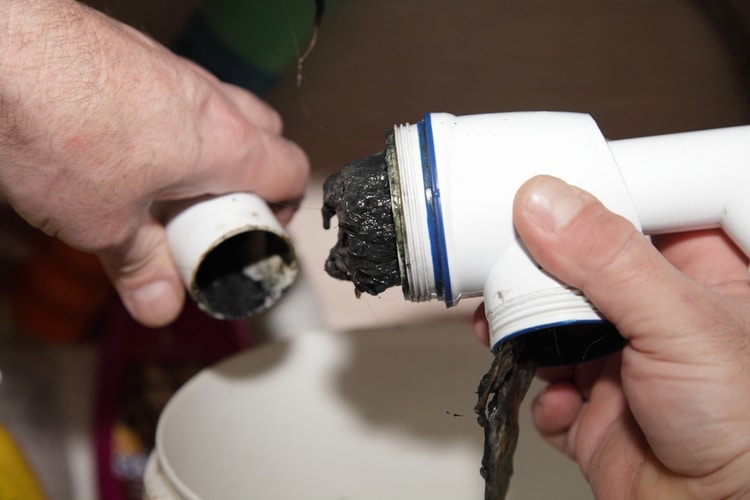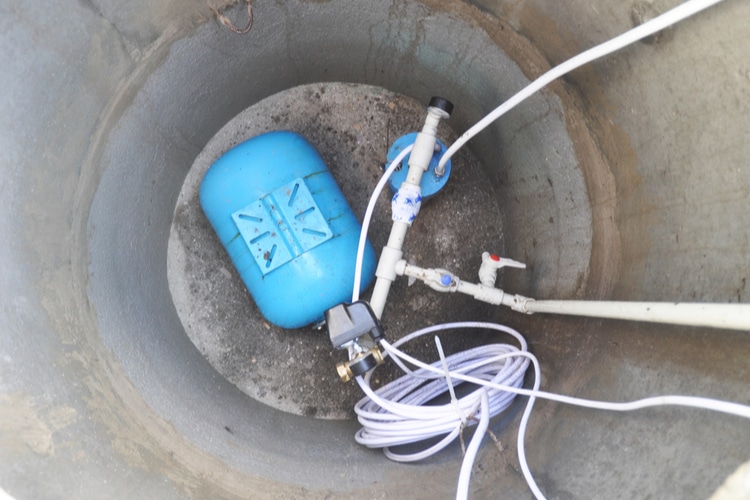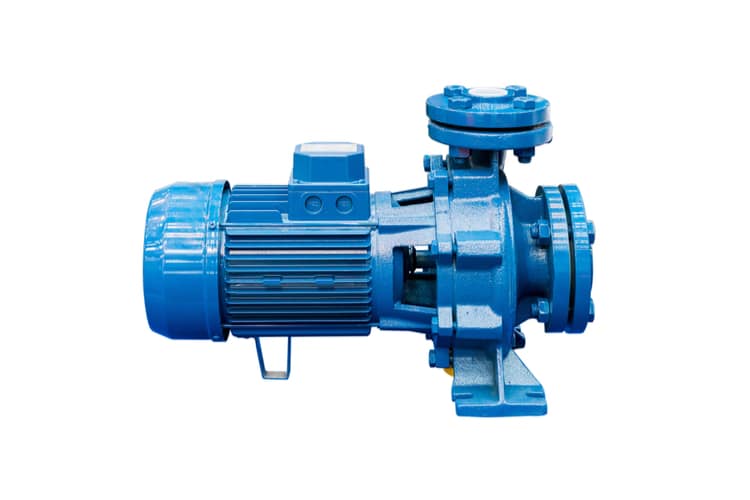Most well water pumps are not silent, but something might be amiss if yours is making loud banging or hammering noises. For example, your well water pump may be making these noises because of hydrostatic shock.
Hydrostatic shock happens when the valves close very fast, trapping air in the system. It also sends shock waves of pressure that increase the water flow wildly and rattle your pipes.
The valves can close too fast due to a clogged system, worn-out bearing assemblies, trapped air, incorrect settings or pump size, or a damaged impeller.
Let’s see what your particular problem might be and how you can fix it.
Why Well Water Pumps Produce Loud Banging Noises?
It’s essential to know the various sounds that your well pump makes and what causes them. Below are all the reasons why well pumps produce loud sounds and how you can fix them.
Clogged System
Sediment, rust, and even sand can enter your well, which will eventually wear out the circulating pump and block the impeller – causing extreme noises. This leads to increased water pressure, especially when sediment starts clogging system parts.

Ultimately, the increased water pressure will result in short cycles and excessive, loud sounds.
To solve this particular problem, you’ll need to clean the well of any debris and sediment.
Ideally, you want to seek assistance from professionals, but if you’re experienced in dealing with such problems, you can also follow the steps below.
Solution to clogged system:
- Clean the system.
- Ensure you remove all debris clogging your water pump.
- Use a cloth to wipe the pump’s intake, then clean the well by pouring a gallon of diluted bleach down the well.
- Use a submersible pump to drain the well and flush out the entire system.
- You can use dirt separators and filtration units to prevent the system from clogging.
Excessive Bearings’ Wear
If the well pump has excessive bearing wear either inside the motor or on the assembly, the pump will make a loud screaming noise.
Before providing a solution, we should note that not all well pumps have bearing assemblies. Only all-electric pump motors have them. They connect the motor with the pump casing and power the impeller to suck and move water.
Solution to excessive Bearings’ wear:
To prevent more damage to other components, you need to replace the noisy bearings instantly.
That being said, you might not be able to buy separate bearings for some well pumps. In that case, you’ll need to replace the whole motor.
It’s better to call your private well contractor and have their assessment first. They’ll help replace the bearings or the motor itself, too.
Trapped Air
If your well pump doesn’t have an air separator, you will have to deal with trapped air in the system. The air can enter the system via a leaky suction line or free-falling discharge.

When there’s air in the system, the well pump can produce loud noises due to extreme vibration. As the volume of air increases, your pump’s performance will decrease.
Solution to Trapped Air:
- Gently turn on the well pump valve until you hear a hissing noise.
- After the hissing sound stops, a water dribble will emerge, indicating the pump has no air.
- Close the valve and ensure the pump is installed correctly since even a slight misalignment can allow air to get in. Enlist the services of a professional to make sure.
Incorrect Speed Setting
Pumps only operate within their given speed settings, as that’s how they’re designed. When someone meddles with these settings and gets them wrong, it can affect the speed at which the valves open and close – causing loud noises. That’s especially the case when the speed setting is too high for the pump.
More often than not, you’ll see the proper settings written on the device. But if you don’t, you might consult the instruction manual or call customer service for your product.
Solution to Incorrect Speed Settings:
- Find the flow switch and turn it down one level.
- Ensure you check the tower rails and radiator to see if they’re operating at the required temperature.
- If you run a pump with a VFD (variable frequency drive) and the pump is still making the humming sound, make sure you have the correct motor’s grounding to the VFD. Incorrect grounding lets the system be a noise transmitter.
Incorrect Pump Size
Your system can be noisy due to undersized or oversized pumps. Oversized pumps are a result of an error during the designing and planning stage when engineers estimate the fittings and piping length inside the well.

This leads to excessive vibration and noise, loosening the joints and connections of the pump and creating piping fatigue.
Solution to Incorrect Pump Size:
A professional will help you check if your well water pump has the correct size. If not, the technician can install soundproof insulators in your pump.You can alternatively opt for replacing the pump and installing a unit with the correct pump size for your well.
Damaged Impeller
If debris enters the pump housing, it can damage the impeller. This causes your pump to produce a loud noise when running.
It’s another problem that might require you to contact a professional, but if you’re experienced, you can handle it by following the steps below.
Solution to damaged impeller:
- Turn off your water pump and flush it.
- Clean the debris from the housing.
- Install a filter on the pump to avoid having this issue again.
Other Sounds That Your Well Water Pump Can Make
Other than banging sounds, your well water pump can make other loud sounds, such as clicking, grinding, rattling, clunking, screeching, or humming sounds.
Clicking Sounds
Clicking is normal when you turn the pump on and off. The pressure controls make the clicking sound.
However, when the sound is accompanied by clicking, there is a risk of control burn-up or stuck relay. Frequent clicking noises indicate that your water pump is short-cycling due to a waterlogged pressure tank.
Grinding Sounds
Grinding noise occurs when two objects collide with one another. Your well pump can make a grinding sound due to a broken impeller or debris in the impeller assembly.
In this case, you’ll either need to clean the impeller assembly or replace the impeller altogether.
Rattling Sounds
The rattling sound is usually shaky and rapid, and it tells you that the impeller is damaged. It varies from grinding to loud rattling based on whether it results from faulty assembly or debris.
Call a professional to assess whether it’s repairable or you need to replace the impeller.
Clunking Sounds
Clunking sounds can come from around the control switches, piping, or water tank and are usually produced at the beginning of the well pump “on” cycle.
The culprit is usually a failing check valve, pump relay switch, or loose piping that rattles or moves when there is rapid water pressure, causing the piping or water tank to shift.
A service contractor will be able to pinpoint the exact cause and offer you solutions based on their findings.
Screaming or Screeching Sounds
Screeching noises from well water pumps come from damaged pump bearings. This issue causes the metal to vibrate, making a sharp, loud noise that’s very unpleasant. To make it go away, you need to replace the faulty or damaged bearings.
Humming Sounds
The well pump makes a humming sound if it runs dry due to insufficient water flow. A leak in your pump’s foot valve makes the pump lose water and pressure, causing the humming sound.
To solve this particular issue, you’ll need to replace the damaged foot valve.
Conclusion
A well water pump makes loud banging noises when its valves open and close too frequently and trap air inside the pump. Other loud sounds might be caused due to sediment and debris clogging the system, bearings that have worn out, unsuitable pumping speed or pump size, or a damaged impeller.
If you’re experienced in electrical repairs and plumbing issues, you might take care of the issue by either cleaning out the system or installing replacements for the failing parts. However, if you’re not, it’s best to seek professional assistance to prevent further damage to the system.
I appreciate you mentioning that regular system checks and preventative maintenance can keep your pump’s bearings from deteriorating prematurely. I have a problem with the well pump’s high bearing wear both externally and internally. I’ll contact a well pump maintenance business to assist me in resolving the issue.